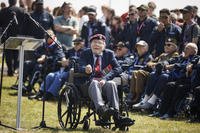The Supreme Court's landmark ruling that a 1964 statute against workplace sex discrimination covers transgender employment rights will give a boost to lawsuits seeking to overturn the military's restrictions on transgender service, according to advocacy groups.
"It's a stunningly good" decision by the Supreme Court which will be "hugely helpful" in lawsuits to allow transgender members of the military to serve openly without fear of discharge, said Shannon Minter, national legal director of the National Center for Lesbian Rights.
Read Next: First Army Unit Gets New Squad Designated Marksman Rifle
The Supreme Court's 6-3 ruling Monday barring employment discrimination against transgender individuals "has great significance for the ban" on transgender military service pressed by the Trump administration, said Jennifer Levi, of GLBTQ Legal Advocates & Defenders (GLAD).
The ruling "undermines any argument the military can make" in defending the current transgender policy, said Levi, transgender rights project director of GLAD.
In its ruling Monday, the Supreme Court said the prohibition in the Civil Rights Act of 1964 against sex discrimination in employment extended to discrimination based on sexual orientation and gender identity.
In his majority opinion, Associate Justice Neil Gorsuch, who was nominated by President Donald Trump, wrote that "an employer who fires an individual merely for being gay or transgender defies the law."
Until Monday's ruling, it was legal in more than half the states to fire workers for being gay, bisexual or transgender. But Gorsuch wrote that "an individual's homosexuality or transgender status is not relevant to employment decisions."
"That's because it is impossible to discriminate against a person for being homosexual or transgender without discriminating against that individual based on sex," Gorsuch said.
A Defense Department spokeswoman referred questions on whether the Supreme Court's ruling had implications for the military to the Justice Department, where a spokesman said there would be no comment.
However, "any Supreme Court holding is binding on the military" under the Uniform Code of Military Justice, said Gary Solis, a Marine Vietnam veteran who went on to serve 18 years as a military judge advocate.
The ruling "is inevitably going to impact on the military" and the status of transgender service members. But the open question is how the military would seek to adapt the current transgender policy to the court's decision, Solis said.
Currently, there are four lawsuits against the military's transgender policy in federal district courts in Washington, D.C., Baltimore, Seattle and Riverside, California, Levi and Minter said.
Because of the slowdown in court proceedings due to the COVID-19 pandemic, the court cases against the military's transgender policy are not expected to go to trial before the end of the year, Levi said.
The Obama administration in 2016 allowed the recruitment and open service of transgender individuals in the military. But the policy began to change when Trump issued a series of tweets in July 2017.
"After consultation with my Generals and military experts, please be advised that the United States Government will not accept or allow Transgender individuals to serve in any capacity in the U.S. Military," Trump said in a Twitter post.
After a study of the issue ordered by then-Defense Secretary Jim Mattis, the current policy went into effect in April 2019, barring transgender individuals from serving or enlisting in the military in most cases unless they served in their original biological sex assignment.
Those who entered the military before April 12, 2019 were excepted, and the policy permitted waivers on a case-by-case basis. Advocacy groups have charged that the policy effectively amounts to a ban on transgender service.
-- Richard Sisk can be reached at Richard.Sisk@Military.com.
Related: Navy Grants First Service Waiver to Transgender Officer












